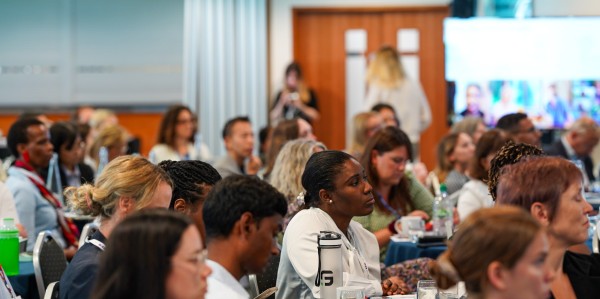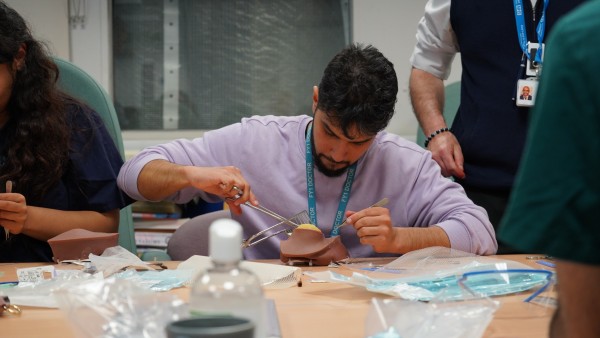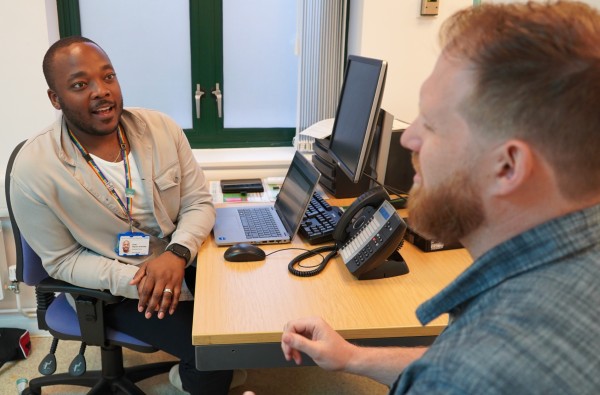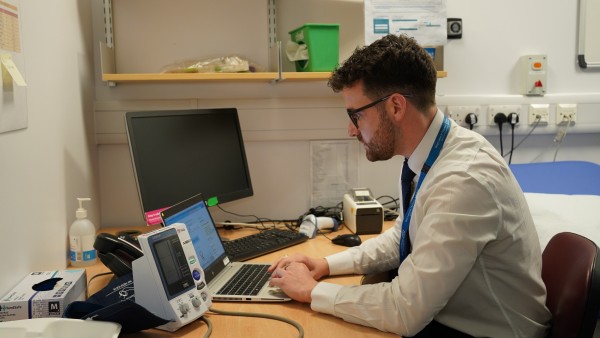In this section you will also find information on
Note: King’s Health Partners is not a statutory body and therefore cannot take sponsor responsibilities for clinical trials. For more information - please visit the intranet of your employer organisation and search for the latest policies.
After identifying a scheme that could potentially provide funding for your research, you should carefully read the funder’s and scheme’s Terms and Conditions (TC) and ensure that you meet the applicable academic requirements. Your organisation may also have requirements to consider. It is crucial to ensure that the funding call and your proposal fall under Frascati definition of research as different policies and processes apply for consultancy and other non-research work. As peer review is generally the mechanism by which research funding is allocated, you should consider discussing your proposal with your peers and experts in the field.
Make sure to review the notice of funding and complete your registration on the funder’s website to have a global idea of the application requirements and supporting documents you will need to provide. Remember to take into consideration internal deadlines.
After identifying a scheme that could potentially provide funding for your research, you should carefully read the funder’s and scheme’s Terms and Conditions (TC) and ensure that you meet the applicable academic requirements. Your organisation may also have requirements to consider. It is crucial to ensure that the funding call and your proposal fall under Frascati definition of research as different policies and processes apply for consultancy and other non-research work. As peer review is generally the mechanism by which research funding is allocated, you should consider discussing your proposal with your peers and experts in the field.
Make sure to review the notice of funding and complete your registration on the funder’s website to have a global idea of the application requirements and supporting documents you will need to provide. Remember to take into consideration internal deadlines.
Advice on developing a successful proposal can be found on certain funders’ websites such as the NIHR, UKRI, Wellcome Trust and the MRC provides examples of successfully funded proposals. The European commission has uploaded a recording of their webinar on how to prepare a successful proposal in Horizon Europe. The RDS provides tips for writing your proposal. Training and workshops may be available in some organisations.
Frascati definition of research
“Research and experimental development (R&D) comprise creative work undertaken on a systematic basis in order to increase the stock of knowledge, including knowledge of man, culture and society, and the use of this stock of knowledge to devise new applications. R&D is a term covering three activities: basic research, applied research, and experimental development.
Basic research is experimental or theoretical work undertaken primarily to acquire new knowledge of the underlying foundation of phenomena and observable facts, without any particular application or use in view. Basic research analyses properties, structures, and relationships with a view to formulating and testing hypotheses, theories, or laws. The results of basic research are not generally sold but are usually published in scientific journals or circulated to interested colleagues. Occasionally, basic research may be "classified" for security reasons.
Applied research is also original investigation undertaken in order to acquire new knowledge. It is, however, directed primarily towards a specific practical aim or objective. The results of Applied Research are intended primarily to be valid for a single or limited number of products, operations, methods, or systems. Applied research develops ideas into operational form. The knowledge or information derived from it is often patented.
Experimental development is systematic work, drawing on existing knowledge gained from research and/or practical experience, that is directed to producing new materials, products or devices, to installing new processes, system and services, or to improving substantially those already produced or installed."
The Budget is a key part of your application, and you should allow plenty of time to prepare it. First, identify the resources needed and gather costs and other documents, it is important to consider the cost-effectiveness of your research project. When preparing your budget, you should read the funder’s T&C for all new application as general guidelines change from one funder to another and for different schemes within the same funding body. Make sure to include all costs permissible under the funder’s T&C. The project should be costed using the full economic cost (fEC) methodology when the project is led by KCL. Only industrial partners will pay the full economic cost while charities and other funding bodies will make a different level of contribution. The following briefly describes the different costs to consider when preparing your budget. For further guidance please contact your local administrator.
Staff costings
All staff working on the project should be costed: Investigator, Co-Investigator, technical and research staff as well as administrative support. Consider the time each staff will spend on the project and consider the funder’s and the leading organisation’s expectations on time commitment. If the position is nominative, request the member of staff’s salary directly from their organisation. Staff-costs and staff-related costs should be requested at the earliest opportunity as some partners may require up to a 6 weeks’ notice period. Ensure that the costs obtained are approved by the financial department of the organisation providing them. Some Trusts may request that you share your proposal, obtain R&D approval and provide a draft application including the financial section before signing-off costings.
- KCL: Worktribe – contact the relevant local administrator
- GSTT: rdcosting
@gstt.nhs.uk , - KCH: kch-tr.
rd-researchcosting ,@nhs.net - SLaM/IOPPN: slam-ioppn.
research ,@kcl.ac.uk
PhD fees and stipend
All costs associated with a PhD studentship should be budgeted when requesting funds. Those costs include PhD fees, stipends and a research training support allowance. PIs must fully cost their time as directly allocated (DA) unless the award pays for the PI's salary and academic time intended for student supervision then it falls into directly incurred (DI) costs.
Equipment purchase, access and maintenance
When entering new equipment in your budget, consider the maintenance and running costs of the equipment during its lifespan and ensure to enter VAT if applicable, import duty and delivery costs. Make sure you have sufficient space for the equipment and that no additional building or installation work will be necessary. Otherwise discuss with your local department lead and cost these requirements. For existing equipment, ensure to include access costs. Finally, when a funder only partially covers the price of a piece of equipment, you must either find another funding source to cover the remaining costs.
Patient and Public Involvement and Engagement (PPIE)
Most funders expect there to be involvement of patients and the public in the design and development of studies, though more is expected on larger studies and less on smaller ones with more limited budgets. Guidance can be found on many funders’ websites. To do PPI well takes considerable time, training in good practice, patient and community connections, and building trusting and respectful relationships. The ‘engagement’ part of PPIE refers to sharing research findings with service users and communities. It is important to build in plans for communicating research findings to public audiences as well as to professional, academic or policy audiences.
Other allowable costs
Carefully read the funder’s T&C and consider all other allowable costs that should be included in your proposal. As well as staff and public involvement and engagement costs, those may include materials and consumables, travel and subsistence, new computing hardware and software, professional fees and training, recruitment and advertisement costs, dissemination costs (such as attending conferences and open-access journal costs), data management and insurance.
Publication and dissemination costs are vital. Publications can be expensive and major funding bodies have strict policies regarding open access publication. Failure to comply may put future funding at risk. The likely impact of research is taken seriously, and research cannot have an impact unless well communicated to relevant audiences.
Before submitting to the funder’s web site, you must obtain approval from the financial department of the leading organisation. The following describes the documents that may be requested for approval please refer to the leading organisation’s guidance at the end of this page.
- Completed costing form or preliminary costings;
- Research facilities and partners’ approved costs;
- Suppliers’ quotes for large piece of equipment;
- Completed risk assessment;
- Final proposal;
- R&D lead approval or evidence of peer-review;
- Preview of your application including budget from the funder’s website;
- If Emeritus position, appointment letter;
- Any other supporting documents.
Please keep in mind that the budget in your costing form/preliminary costing form should be identical to the costs entered on the funder’s website and on the justification of resources to obtain approval. Only approved costings can be shared with funders and please must never submit before receiving approval from the lead organisation finance department.
Some funders may request additional institutional approvals. In those cases, please contact your R&D office or administrator before submitting as you may be asked to add the relevant institutional representative’s contact details to the application form. The proposal once submitted by the PI will be sent to an institutional representative and the host organisation will be the final authoriser and submitter. please submit your application five working days prior to the funder’s submission deadline.
Research Ideas
A short range of guides to understand what happens next when you have an idea for research.
Research
Research activities are defined by the conventions set out in the Frascati Manual (2015).
Research and experimental development (R&D) comprise creative and systematic work undertaken in order to increase knowledge - including knowledge of humankind, culture, and society - and to devise new applications of economic, cultural, or social value of available knowledge.
Basic research is experimental or theoretical work undertaken primarily to acquire new knowledge of the underlying foundations of phenomena, observable facts, and behaviours, without any particular application or use in view.
Applied research is an original investigation undertaken in order to acquire new knowledge. It is, however, directed primarily towards a specific intended aim or objective.
Experimental development is systematic work, drawing on knowledge gained from research and practical experience and producing additional knowledge, which aims to produce new products, experiences or processes, or to improve existing products, experiences or processes.
Service Evaluation
Definition
The NHS defines a service evaluation as a way to define or measure current practice within a service. The results of the service evaluation help to produce internal recommendations for improvements. These recommendations are not intended to be generalisable beyond the service area.
Registration and ethical approval
King’s College London (KCL)
Service evaluations do not require ethical approval from KCL but if the project involves collection of personal data it may need to be registered on King’s Data Protection Register (KDPR). Queries can be directed to the Research and Governance Office
Guy’s and St Thomas Trust Evelina (GSTT)
Service evaluations need to be registered on the Trust’s database portal by a GSTT staff member under the project reason: other. Service evaluations will need to be approved by a service lead, directorate lead and QUIPS audit lead.
King’s College Hospital (KCH)
Service evaluations are managed locally at the care group level. Staff will need to refer to KCH service evaluation policy for further information and can direct question to the R&I team. Please visit this link (Kwiki) for further information on Clinical Audit, Research and Service Review at KCH.
Contacts
King’s College London (KCL): Research governance team rgo
QUIPS team: Email qips
King’s College Hospital (KCH): R&I team: kch-tr.
Audit
Definition
Audits can be defined as a type of service evaluation where the level of service being provided is assessed against a reference or standard, for example a new NICE guidance.
Registration and ethical approval
King’s College London (KCL)
Audit do not require ethical clearance KCL but if the project involves collection of personal data, the project may require to be registered on King’s Data Protection Register (KDPR). Queries can be directed to the Research and Governance office.
Guy’s and St Thomas Trust Evelina (GSTT)
Audits need to be registered on the Trust’s database portal by a GSTT staff member under the project reason: other. Service evaluations will need to be approved by a service lead, directorate lead and QUIPS audit lead.
King’s College Hospital (KCH)
Please contact the R&I team for further guidance. Please visit this link (Kwiki) for further information on Clinical Audit, Research and Service Review at KCH.
Contacts
King’s College London (KCL): Research governance team rgo
QUIPS team: Email qips
King’s College Hospital (KCH): R&I team: kch-tr.
One of the most important steps in the research process is developing a good research question and hypothesis. A research question should lay out what you want to find out in your research project. You can have multiple research questions in a project, if you wish.
The RDS provide some guidance on how to develop a research question.
Conducting a literature review, or a scoping review, prior to conducting any research is important and useful to understand what work has already been done, so you can identify the gaps in your chosen topic or research field.
The Johns Hopkins University of Medicine provide useful information how to conduct a literature review - navigate their website and literature review page.
Some research projects involving human participants may require registration and ethical approval. This can be done via the Research Ethics Management Application System (REMAS) portal by a King's College London staff or student. Staff will need to establish the risk level of their project using the risk checklist and follow the adequate registration process. For more information see Research Ethic Committee (REC) website and registration processes.
For guidance on ethical approval requirements external to see the REC website.
Contacts:
Research Ethics Office: rec
Guy’s and St Thomas NHS Foundation Trust and Evelina London Children's Hospital: R&D will answer questions. Please visit the intranet to find out more.
King’s College Hospital NHS FT: Research and Innovation central will answer questions and assign a facilitator when required. R&I Central inbox kch-tr.
Research Design
The British Medical Journal have collated a series of articles on how to read and interpret different kinds of research papers, which give a useful introduction to a range of study designs and types of research questions that they can address.
The Clinical Trials Toolkit provides practical advice to researchers in designing and conducting publicly funded clinical trials in the UK. Through the use of an interactive routemap, this site provides information on best practice and outlines the current legal and practical requirements for conducting clinical trials.
The MRC provide advice and guidance on the development, evaluation and implementation of complex interventions.
NICE public health guidance provides a set of generic principles that can be used for planning, delivering and evaluating behaviour change interventions.
A research protocol is a study plan. It is a useful tool to make sure that all members of the research team are following the same plan, and it can be used to monitor the study’s progress and keep track of the research outcomes. Different research protocols will be needed depending on the kind of research you are planning to do, but a few useful guides can be found below.
- A useful paper paper on how to write a research protocol.
- A sample research protocol provided by clinicaltrial.gov can be found on their website.
- The Health Research Authority provide guidance on how to write a research protocol as well as templates.
The sample size is the number of participants needed in a study to adequately answer the research question and achieve the aims of a study.
Sample sizes are calculated in the study design phase. Sometimes, the number of participants in a study is restricted due to time, ethical considerations, and budget, but it is worth remembering that too small a sample size may impact the generalisability of a study, and the ability to detect any effects.
When should you ask, what are the benefits, and who do you ask?
Public and Patient Involvement and Engagement is about building relationships and partnerships with patients and the public so that they have a say in research. In enables research to be carried out in conjunction with researchers, rather than research being done ‘to’ or ‘for’ patients and the public.
The NIHR provide general PPIE resources and information for applicants to NIHR Research programs.
King's Clinical Trials Unit
KCTU can provide support with statistics, randomization, trial management, e-CRF database, health economics, and qualitative research.
Research Support Service
The RSS supports the development of strong competitive applications and can assist Principal Investigators with proposal reviews, trial design, and planning Public and Patient Involvement and Engagement (PPIE) activities.
Unit for Medical Statistics
The UMS provides support with health data statistics.
A collection of recent papers and relevant publications on the inclusion of adults with impaired capacity to consent can be found on Consult.
Funding
Getting funding for research projects can be time consuming and difficult. But there are plenty of useful guides and tips to help find the best funding option for your research. We have collated some of these below:
- NIHR: How to find funding;
- Royal College of Paediatrics and Child Health: Research Funding Opportunities;
- UKRI: Funding Finder;
- King's College London: Funding Opportunities.
The funding environment is extremely competitive and every funder has their own unique requirements. Guidance on how to write a successful grant application can be found on some funders' websites. The links below provide general tips when writing a grant application.
- NIHR Research Design Services (RSS): Tips for Writing Your Research Proposal and details for drop in sessions;
- NIHR top tips on how to make a strong application;
- UKRI's 12 Top Tips for Writing a Grant Application;
- King's College London Research Development Team is a good point of contact for strategic or research specific advice on putting a bid together.
The Department of Health provide a framework for the NHS and its partners to identify, recover and attribute the costs of health and social care R&D (ACoRD), in a transparent, and consistent manner. It clarifies the distinction between the three costs of research: research costs; NHS support costs; treatment costs.
King’s Clinical Academic Training Office (KCATO) provides information and support for anyone working across King's Health Partners.
They developed the Clinical Academic Training and Career Hub (CATCH) which provides a wide variety of advice and tools for anyone considering, or embarking on, a clinical academic career.
Inspiring stories from clinical academics can also be found on their website.
The peer review process is when a piece of research is evaluated by fellow researchers, typically after it is submitted to a research journal. It is a process that is used to improve the quality of research and validate the originality.
A step-by-step guide to peer review is available from the British Medical Journal.
King’s College London research support webpage provides guidance on how to manage research data. There is a dedicated section for understanding and safely working with health data, including legal framework, funders’ guidelines, signposting to Caldicott guardians, and available training. This can be found on their website.
Principal investigators can seek data management support from different advisory services such as King’s College London Clinical Trial Unit.
Projects involving human participants will need to be registered on a trial database and might also require ethical approval by the lead organisation’s ethics committee and an external ethics committee.
For some help establishing category a project falls into, see links below.
NIHR – Research, service evaluation or audit?
KCL – Is my project research, service evaluation or audit?
HRA – Decision tool table: activities in healthcare
The Health Research Authority provides specific guidance on research involving children.
Ethical Research Involving Children (ERIC) also provides informed ethical guidance for research involving children.
UNICEF, Office of Research-Innocenti, has published several papers on the involvement of children and young people in research including Innocenti projects and reports
Funders may also have their own policies and guidance that need to be taken into consideration.
Find out more at UKRI - Research with Children and Young People.
Nomis is a service provided by Office for National Statistics (ONS), the UK’s largest independent producer of official statistics. The website publishes statistics related to population, society, and the labour market at national, regional and local levels.
National Institute for Health and Care Excellence (NICE) produce guidance, advice, quality standards and information services (NICE) for health, public health and social care.
The Cochrane Library is a collection of six databases that contain different types of high-quality, independent evidence to inform healthcare decision-making, and a seventh database that provides information about Cochrane groups.
The PROSPERO register is an international database of prospectively registered systematic reviews in health and social care, welfare, public health, education, crime, justice, and international development, where there is a health related outcome.
A hackathon is an event in which a team of people are exposed to a problem or challenge that requires collaborative problem solving. The participants have, in general, different backgrounds and expertise.
A paper on the benefits of science hackathons can be found on the PubMed website.
To improve the completeness of reporting, and ultimately the replicability, of interventions, an international group of experts and stakeholders developed the Template for Intervention Description and Replication (TIDieR) checklist and guide.
The EQUATOR network maintains a comprehensive collection of online resources providing up-to-date information and tools relating to health research reporting.
One way to disseminate research findings is to publish a paper in an academic journal. There are guides available to help with academic writing. We have collated some of these below.
The Pathway to Publishing: A Guide to Quantitative Writing in the Health Sciences
There are many things to consider when writing an academic paper; the audience of the paper, how to present your findings, and which journal you should submit to. The end goal of writing an academic paper is to comprehensively share findings in a format that will get published. The resources below provide general advice on how to write a first class paper.
Nature - How to write a first-class paper
Elsevier - 11 steps to structuring a science paper editors will take seriously
Most academic journals will require you to write a cover letter briefly explaining your research and why it should be considered for publication.
Research can influence policy and practice by acting as an evidence base for change and mobilisation. Researchers can influence policy by identifying problems and proposing solutions, evaluating interventions, and researching harms and benefits, among other things. If you’d like to find out how research and health policy can interacts, please see an NIHR article on how researchers can influence policy and practice.







